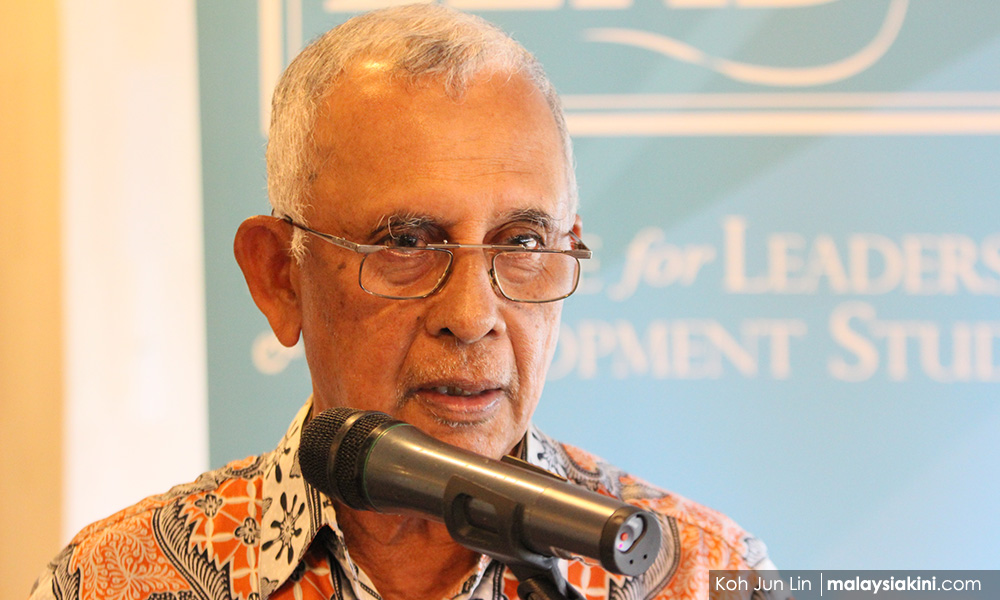COMMENT | Prophet Muhammad (SAAS) used to pray that his life be spared from debt. This explains the simplicity of his lifestyle, getting by with just dates, bread, milk and water. After all, when one’s need is simple, life will be not suffocating.
The government under Prime Minister Najib Abdul Razak has obviously not understood this principle of simplicity. Instead of keeping the debt low and manageable, under Najib, the level of debt has shot up.
According to Professor KS Jomo and Raisa Mukhtar:
"Malaysia has a debt problem. Government debt is about 53 percent of the GDP, just below the already increased 55 percent debt-to-GDP ratio threshold. The big jump in such government debt from 41 percent in 2008 to 53 percent in 2009 followed the last change of prime ministers."
To which they further added: "Contingent liabilities refer to debt commitments related to government guaranteed loans. With contingent liabilities growing rapidly, the overall consolidated public sector debt-to-GDP ratio has risen to 68 percent of GDP."
Granted the sheer lack of transparency, the government may be sitting on a higher debt pile, since government-linked companies like Malaysia Airlines (MAS) or, FGV Global which is part of Felda, haven't been doing well.
If anything, MAS has had to retire close to 6,000 ground and aircrew. There is no telling when, indeed, if the shares of FGV Global can go beyond its listed price of RM4.80 ever. It has been more than three years and the shares are still trading at half their price and even lower, though Najib insists that Bursa Kuala Lumpur is on a strong run.
Indeed, 30 percent of Malaysia's annual budget is contributed by Petronas alone. This has been the trend for well over a decade. It means the Malaysian government, under Najib, has done nothing to reduce Malaysia's exposure to the peaks and valleys of the energy industry.
One should further note that most of the country's carbon resources were drilled and found in the 1970s. Regardless of how rich Malaysia may be in oil and gas, especially off the coast of South China Sea, these are not resources that exist in indefinite or infinite supply.
Thus, in order to avoid the curse of the "black gold" (i.e. oil), one must be prepared to take the country forward based on digital disruptions, services and the knowledge economy, all of which Malaysia remains weak in or is getting weaker by the day.
In fact, research by Nikkei Asia Review has shown that Huawei Technology has been in Malaysia over the last 16 years. While Huawei has helped Malaysia increase its broadband penetration, with AliPay working in tandem with Maybank to improve its AliPay e-payment system, Malaysia has done nothing of note on the digital front.
Meanwhile, spending hasn't been reined in, due to the massive size of the government. The size of the civil service – estimated at 1.6 million by Mohd Sheriff Kassim (below), the former secretary-general of the ministry of finance - remains in place.

While such a large civil service has the effect of buttressing the government, making Malaysia more stable, it also hampers efforts to transform the government, making Malaysia more stagnant too.
So while Sheriff’s desire to right size the civil service is quite convenient - indeed, in his mind, it may even be necessary to prevent a government financial meltdown - Najib Razak knew that doing so would be the kiss of death politically, given the impending general election.
This being the point, too. If Najib's financial reforms are always delayed due to the electoral cycles, then when can Malaysia ever change at all?
The contingent liabilities of 1MDB alone, according to the research of Jomo and Raisa, have taken up nearly 2.5 per cent of the country's GDP.
It should be noted that Sheriff’s figure of 1.6 million includes armed forces, police, education and hospital personnel. The Congress of Unions of Employees in the Public and Civil Services (Cuepacs) claims that these should not be included in the headcount, as is the case in some other countries, and consequently claims the civil service numbers 500,000.
Even so, there is a self-serving logic to Cuepacs’ suggestion - they don’t want their heads to roll.
However the headcount is made, the fact is the Malaysian civil service is a behemoth, one of the largest in the world. In February last year, Johari Abdul Ghani, the second finance minister, had warned that the annual payroll was already at RM74 billion while pension payments were RM19 billion a year.
There is one civil servant for every 19.37 people in Malaysia, according to Johari, as opposed to 1 to 71.4 in Singapore; 1 to 110 in Indonesia; 1 to 50 in South Korea; 1 to 108 in China; 1 to 28 in Japan; 1 to 84 in Russia and 1 to 118 in Britain.
The bloated size of Malaysia’s service causes government expenditure to rise yearly and creates a government that is unwieldy and bulky.
When a government is facing charges of corruption, to which Najib is trying to weather, it cannot reform the economy any more then it can continue to provide subsidies and handouts to pacify its political enemies. This is why Najib has to go, and soonest.
With or without the impending general election, Najib has been a blight on the country. And, with each passing day, the country's debt will only increase, making any attempt to balance the books by 2020 all but a chimera and illusion.
Without strong reform, the ratings of Malaysia's creditworthiness will take a hit eventually. When the cost of borrowing shoots up internationally, Malaysia would either have to bite the bullet - thus causing more outflow of an already weak ringgit albeit some technical retreat recently - or rely even more on China to tide it over.
But there are no free lunches in the world of international relations. More debt denominated with and in China will mean less maneuverability on any issue ranging from Malaysia's stake in South China Sea as well as Asean and East Asia writ large.

The death of Malaysia - as a sovereign country - will begin with the inability to manage the massive debt, period.
Pakatan Harapan is ready to lead where Najib has failed. But Harapan has no plans to slash and cut the civil service. That is not even our first or last option irrespective of the financial convulsions Najib enforced on Malaysia.
Rather, leakages and corruption produced by Najib will be stopped. Thus, Harapan is agreeable to the idea of Dr Mahathir Mohamad that every single contract previously approved by Najib, which has and will lead to more debt, would have to be re-examined properly.
This includes the East Coast Railway Link (ECRL), which is not a game changer, since it is built on a single, rather than a double track, on bloated costs and interest rates that are screaming for perpetual bail-outs in the future.
Harapan will also recover the national loot stolen by those in authority and return it to the rightful owners, the people.
In addition, Harapan will return true dignity back to the civil service as the credible backbone of the government’s administration. Harapan will stop senseless outsourcing contracts involving foreign or domestic consultants who charge the government and the people a bomb for services way below the standard of what our civil service has been providing.
The days where the civil service becomes just a mere statistics or data provider to these “outrageously expensive consultants” who are experts in “PowerPoint” presentations are over for good.
Harapan will not only return the glory of the civil service once again, it will honor and dignify them as the true backbone of the government administration.
There will be no political interference nor will there be enforced “outrageously expensive consultants” to force the civil service to toe the government lines.
Instead, the civil service will be fully empowered to do their jobs with the right dignity without fear or favor in the best interests of the people and the nation, rightfully.
RAIS HUSSIN is a supreme council member of Bersatu. He also heads its policy and strategy bureau.
The views expressed here are those of the author/contributor and do not necessarily represent the views of Malaysiakini.

